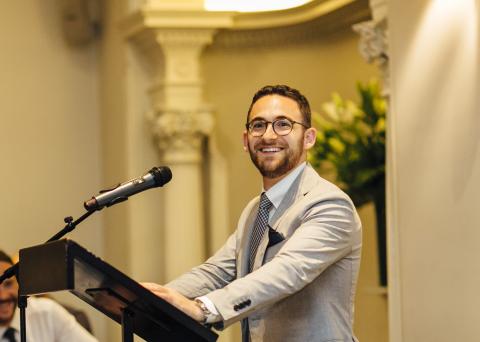
Dr Joshua Casan is a final-year Haematology advanced trainee at Monash Health. In 2018, Joshua was selected to take part in the Melbourne Genomics Medical Specialists Immersion Program, to undertake a genomics study of Hodgkin lymphoma.
We asked Joshua some questions about his project.
Why did you apply for the Medical Specialists Immersion Program?
The chance to get involved in Melbourne Genomics, and gain experience with genomics through a research project with a strong translational focus, was very appealing. The opportunity arose through discussions with Professor Stephen Opat and Associate Professor Jake Shortt, at Monash Health.
Tell us about your project.
We are working to produce a new methodology, enabling high-throughput genomic testing for Hodgkin lymphoma.
Hodgkin lymphoma is a relatively common haematological cancer, and is usually associated with a very good prognosis. However, there is a subset of patients who continue to do poorly – particularly those over the age of 60 – and we don’t really understand why.
One of the biggest challenges of investigating Hodgkin lymphoma cancer cells is the fact they are actually very rare within the tumour bulk – accounting for only about one to three per cent of the cells. The majority are inflammatory-type cells caused by the cancer and don’t harbour the same genetic abnormalities as the Hodgkin lymphoma cells.
This means you have to manually dissect out those rare malignant cells (which is extremely labour-intensive) to ensure there is enough genetic material to perform a genomic test. It’s not really a viable option for large numbers of samples, and it’s too onerous and expensive to do in a clinical setting. This problem has limited the interrogation of Hodgkin lymphoma on a genomic level, and thus our understanding of the disease biology.
Our project is trying to find a way to take pre-existing patient samples and ‘sort’ the Hodgkin cells using a high-throughput method, thereby generating a pool of Hodgkin cells relatively quickly and in a largely automated fashion.
What is the ultimate goal?
Sorting cells will enhance our ability to study Hodgkin lymphoma genetics. We believe this will give us an insight into the biological underpinnings of those Hodgkin lymphoma patients who do poorly. The dream is that we come up with a methodology that sorts Hodgkin lymphoma cells for sequencing or other genomic investigation in a high-throughput manner. This would mean much shorter turnaround times, and larger numbers of samples from which we can derive meaningful results and datasets.
What does it mean for patients?
Eventually, it could enable Hodgkin lymphoma patients to derive the same benefits from genomic testing that we are now seeing in other cancers. If we can understand the biology at the DNA level, then we can look for markers that portend resistance to conventional therapies – or perhaps identify new targets for new drugs and therapies.
If you can make this process 10 times faster and do 10 times the number of samples for a reasonable price, you start to open up the opportunities for incorporating that test into clinical practice. We’re not under any illusions that this is around the corner as an immediate outcome of my current project, but it will certainly lay some very useful foundations.
The procedure we are working on will also open up a huge potential biobank for future research, and the technique could also be adapted to other tumour subtypes where the cancer cells are rare in the tumour bulk, such as angioimmunoblastic T cell lymphoma.
The Medical Specialist Immersion Program provides an opportunity for medical specialists to gain experience in genomics by undertaking a research project, and/or a clinical laboratory placement over a six to twelve-month period.
